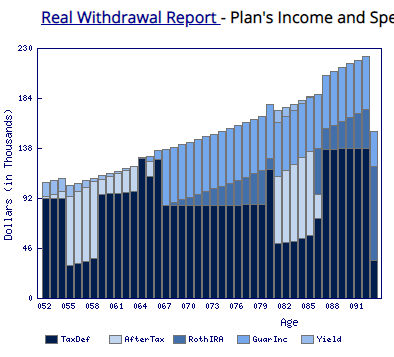Also - if you can keep some of your retirement savings in your 401k (vs rolling to an IRA) **AND** your company supports the rule of 55 (most, but not all 401k's support this) you can start making withdrawals at age 55. You'll need to read your plan summary document and/or ask HR. (And if the HR rep doesn't know, keep digging/escalating till you find someone who knows or can give you the plan summary documents.)
+1 (with a caveat)
edit: See update below about OP being age 52 currently and j*b loss is imminent.
I would look for the term "allows
partial distributions" vs requiring a full distribution and not get too hung up on the "Rule of 55" language -- at least initially. . This should be defined in the plan documents and/or the rep should be able to answer this simple question. If the company doesn't know anything about the informal "Rule of 55", you, on your own, can handle waiving the penalty if the company doesn't code for it properly on the 10990R when you file your taxes on IRS form 5329, but you will need to be able to take a paritial-distribution from the 401k for any of this to happen. IRAs do not have the luxury of the rule of 55 tax treatment.
Also regarding plan documents, please realize that there are both the (SPD) ie Summary Plan Description that you will likely be able to easily find on the plans web site and or may have been mailed to you in the past.
There is also the
full plan documents that
legally define the plan. These are also available but you will typically have to write a letter to the plan administer requesting them following the procedure described in the back of the SPD documents. The plan may also charge you a copying fee for the full plan documents, but in my case it was waived.
All of this is based on the assumption that your plan is an ERISA qualified plan and that the ERISA rules/laws apply.
edit:
"Rule of 55" may not apply in this case. OP suggested he may loose the j*b soon and is currently age 52. You need to separate from your employer in or after the year you attain age 55 for this to apply. Now if OP gets a new job with a 401(k) that allows in-bound rollovers and keeps until Jan 2 or so the year he turns 55, then this may be an object.
Actual verbiage from IRS From 5329 that addresses this is below:
"Qualified retirement plan distributions (doesn’t apply to IRAs) you receive
after separation from service when the separation from service occurs in or after the year you reach age 55 (age 50 for qualified public safety employees). For distributions to qualified public safety employees on or after December 30, 2022, include distributions to employees with 25 years of service with the plan, distributions to firefighters covered by private sector retirement plans, and distributions to those employees who provide services as a corrections officer or as a forensic security employee, providing for the care, custody, and control of forensic patients, who meet the age requirement above."
-gauss


